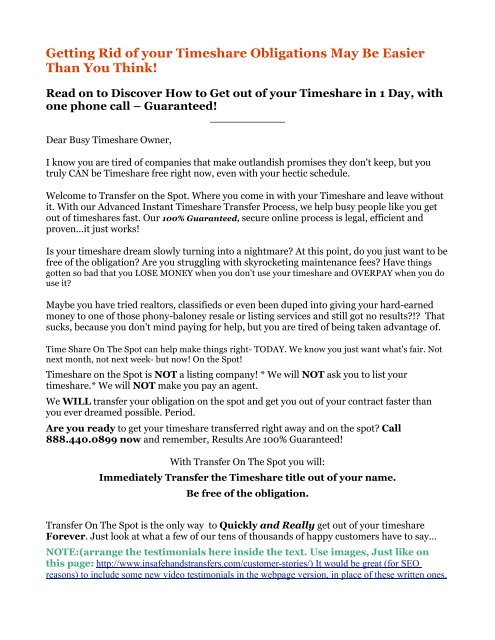In a typical points program, you sign up with the program by buying a subscription. You then receive a specified number of points every year, with the variety timeshare compliance reviews of points you receive established by the terms of the membership you acquire. You can then exchange these points for accommodations at the resorts that take part in the points program.
Just like vacation clubs, a lot of points programs provide multiple resorts in which you can schedule weeks. The number of points required to get lodgings will generally vary with the lodgings chosen. Elements affecting the variety of points needed for your requested accommodations consist of: The appeal of the resort The size of the lodgings The number of nights of tenancy The particular nights asked for (weekend and holiday nights typically need more points per night than do mid-week nights) The season of the year.
Many points programs will permit you to collect points over 2 or more years, so that you can trade to a larger unit or more popular resort if you want to take a trip less frequently - what is a timeshare?. Some points programs will also permit you to inhabit a resort for less than a complete week at a lowered number of needed points.

I expect that other points programs will include similar functions in the future. I likewise expect that regular tourist programs operated by travel companies such as airline companies and hotel chains will establish tie-ins with timeshare points programs to more extend point generation and redemption opportunities. Points programs can be linked to a deeded ownership or can be a direct "buy-in" not linked to ownership of a specific week.
Points programs can be run by a program operator, or can be part of a trip club timesharing program. Just recently, some exchange business (see Lesson 3 for a discussion of https://topsitenet.com/article/1035345-some-known-details-about-how-to-cancel-westgate-timeshare-contract/ exchange companies) have started establishing points programs. A crucial interest in points programs is the long-lasting "value" of your points in booking accommodations.
If you own or are thinking about purchasing into a points system, you ought to inspect the program files thoroughly to determine what securities you may have against such losses in exchange power. Points programs and right-to-use resort homes have numerous typical functions, and many of the cautions formerly described for right-to-use jobs also apply to points programs.
The Basic Principles Of How To Sell Timeshare Points
Through such exchanges, you can acquire timeshare accommodations in desirable vacation locations throughout the world. Exchanging likewise permits you to trip at different times of the year, even using a fixed week. The most basic exchange technique is to discover a timeshare owner who has an interest in exchanging his/her week for your week.
Another exchange option happens when your timeshare ownership is part of an exchange program that consists of several resorts in various places. In these plans, you can exchange your week for a week at another resort within the group. Lots of timeshare management business that run resorts in different locations offer this type of exchange service as part of their management services.
The most typical exchange approach is through a timeshare exchange company. To do this, you "deposit" your week with the exchange company. As other owners deposit their weeks (and as resorts deposit unsold weeks with the exchange business), the exchange business builds up a stock of weeks that are available for exchanges (how to rent your timeshare on airbnb).
The exchange business hence works as a clearinghouse for people making exchanges. Keep in mind that the owner of the week you exchange for will nearly never be the individual who gets the week you transfer (what is the best timeshare). The need for lots of resorts varies seasonally. For instance, for people living in the northern hemisphere, beach locations are popular in the summertime, whereas ski resorts are most popular throughout ski seasons.
This value impacts both the price of the unit and the quality and kinds of exchanges you can make with the timeshare system. Resort Condominiums International (RCI) and Period International (II), the two largest exchange companies, both divide weeks into 3 seasons, designated by color. For RCI, the classifications are: Red: high demand season White: intermediate need season Blue: low need season For II, the classifications are: Red: high demand season Yellow: intermediate need season Green: low need season The designations of seasons differ with each resort.
You should likewise understand that even within these seasons, some weeks are in higher need than others. For example, July and August weeks in southern California are usually in greater demand than are October weeks, although all of the weeks are considered high demand weeks. This means some red weeks are "redder" than other red weeks.
Rumored Buzz on Where To Buy A Timeshare
These internal season or date classifications typically differ from RCI's and II's seasonal classifications for the exact same resort. YANK has many other articles that offer recommendations and information on timesharing. Follow these links to the TUG Recommendations page and the PULL Timeshare FAQ page. Timeshare purchases can be divided into purchases of "brand-new" systems (purchased from the resort designer) and "resale" units (purchased from any party aside from the developer, such as an owner, a timeshare reselling agent, or a house owners association).
Developers are the entities that develop timeshare projects by developing the resort (or by transforming an existing resort) and offering the systems to purchasers. Developers run the range from inadequately financed, minimal operations to popular travel and leisure corporations such as Marriott, Hilton and Disney. A number of the early developers of timeshare jobs were marginal operations, and added to the bad picture of timesharing.
Sometimes the designer handles both task advancement and sales. Other times, the designer will organize for a company that specializes in timeshare sales to market and sell the intervals to purchasers. To intrigue people in going to a sales presentation, the sales program normally consists of monetary rewards to individuals who participate in sales presentations.
Timeshare sales and marketing expenses can quickly be 50 percent or more of the designer's prices. You might be amazed that sales and marketing costs could be so high, however a great timeshare job can easily support these expenses. For instance, consider that a designer can most likely develop and provide a twobedroom condominium unit in most parts of the United States for disney world timeshare about $150,000 per unit.
If the developer spends half this quantity marketing the units ($ 250,000 per unit), the building expense and sales and marketing expense together will total $400,000, leaving $100,000 earnings per system. As pointed out formerly, a resale takes place when a non-developer owner of a timeshare week sells that week to another party.
Some resorts have on-site resale representatives who accept listings from owners who wish to sell their timeshare systems. There are a range of factors why people offer timeshares they own, consisting of deaths, divorces, monetary emergencies, changes in individual vacation habits, and, sadly, people discovering that timesharing does not work for their lifestyle.
